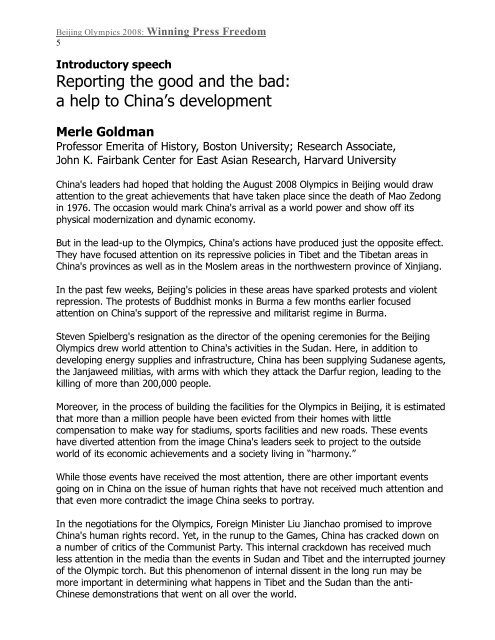Beijing Olympics 2008: Winning Press Freedom - World Press ...
Beijing Olympics 2008: Winning Press Freedom - World Press ...
Beijing Olympics 2008: Winning Press Freedom - World Press ...
Create successful ePaper yourself
Turn your PDF publications into a flip-book with our unique Google optimized e-Paper software.
<strong>Beijing</strong> <strong>Olympics</strong> <strong>2008</strong>: <strong>Winning</strong> <strong>Press</strong> <strong>Freedom</strong><br />
5<br />
Introductory speech<br />
Reporting the good and the bad:<br />
a help to China’s development<br />
Merle Goldman<br />
Professor Emerita of History, Boston University; Research Associate,<br />
John K. Fairbank Center for East Asian Research, Harvard University<br />
China's leaders had hoped that holding the August <strong>2008</strong> <strong>Olympics</strong> in <strong>Beijing</strong> would draw<br />
attention to the great achievements that have taken place since the death of Mao Zedong<br />
in 1976. The occasion would mark China's arrival as a world power and show off its<br />
physical modernization and dynamic economy.<br />
But in the lead-up to the <strong>Olympics</strong>, China's actions have produced just the opposite effect.<br />
They have focused attention on its repressive policies in Tibet and the Tibetan areas in<br />
China's provinces as well as in the Moslem areas in the northwestern province of Xinjiang.<br />
In the past few weeks, <strong>Beijing</strong>'s policies in these areas have sparked protests and violent<br />
repression. The protests of Buddhist monks in Burma a few months earlier focused<br />
attention on China's support of the repressive and militarist regime in Burma.<br />
Steven Spielberg's resignation as the director of the opening ceremonies for the <strong>Beijing</strong><br />
<strong>Olympics</strong> drew world attention to China's activities in the Sudan. Here, in addition to<br />
developing energy supplies and infrastructure, China has been supplying Sudanese agents,<br />
the Janjaweed militias, with arms with which they attack the Darfur region, leading to the<br />
killing of more than 200,000 people.<br />
Moreover, in the process of building the facilities for the <strong>Olympics</strong> in <strong>Beijing</strong>, it is estimated<br />
that more than a million people have been evicted from their homes with little<br />
compensation to make way for stadiums, sports facilities and new roads. These events<br />
have diverted attention from the image China's leaders seek to project to the outside<br />
world of its economic achievements and a society living in “harmony.”<br />
While those events have received the most attention, there are other important events<br />
going on in China on the issue of human rights that have not received much attention and<br />
that even more contradict the image China seeks to portray.<br />
In the negotiations for the <strong>Olympics</strong>, Foreign Minister Liu Jianchao promised to improve<br />
China's human rights record. Yet, in the runup to the Games, China has cracked down on<br />
a number of critics of the Communist Party. This internal crackdown has received much<br />
less attention in the media than the events in Sudan and Tibet and the interrupted journey<br />
of the Olympic torch. But this phenomenon of internal dissent in the long run may be<br />
more important in determining what happens in Tibet and the Sudan than the anti-<br />
Chinese demonstrations that went on all over the world.





